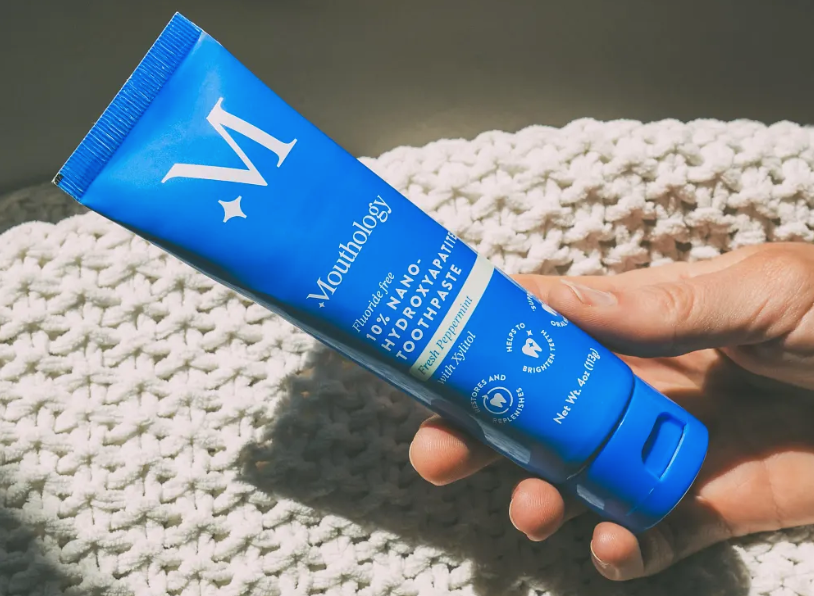We all want to keep our smiles bright and healthy, but have you ever stopped to think about what's in your toothpaste? Many conventional brands contain ingredients like fluoride, artificial sweeteners, and synthetic preservatives that raise eyebrows for their potential health risks. As we become more aware of what we put in our bodies, the demand for nontoxic toothpaste is on the rise.
Non-toxic toothpaste offers a refreshing alternative, formulated without harmful chemicals while still delivering effective oral care. It's not just about avoiding fluoride; it's about choosing a product that aligns with our values of safety and health. As we navigate the aisles of dental care, understanding what's lurking in our toothpaste can empower us to make better choices for ourselves and our families. Let’s dive into what makes non-toxic toothpaste a worthy addition to our daily routine.
What is non-toxic toothpaste?
Non-toxic toothpaste is a dental care product formulated without harmful ingredients. These formulations exclude synthetic preservatives, artificial colors, fluoride, and other potentially toxic substances. Non-toxic toothpaste aims to provide effective oral care while prioritizing safety.
We recognize the importance of eliminating exposure to certain chemicals found in traditional toothpaste. For those concerned about potential health risks, non-toxic options present a safer alternative. Conventional toothpaste may contain ingredients like triclosan, sodium lauryl sulfate (SLS), artificial sweeteners, and parabens, all of which are considered harmful to health.
Non-toxic toothpaste opts for natural ingredients that perform well without compromising our safety. Examples of common ingredients include baking soda and essential oils, which effectively clean teeth and freshen breath without adverse effects. Many brands also focus on gentle formulations suitable for all ages, making them ideal for adults, kids, and even infants.
In this growing market, we find that consumers increasingly seek out non-toxic options, reflecting a broader awareness about the potential dangers of certain chemicals. Selecting non-toxic toothpaste ensures we make informed decisions about our oral care routines. As we navigate through the various choices available, prioritizing products that do not contain aggressive chemicals supports our health while maintaining a commitment to eco-friendly practices.
Why should you consider using non-toxic toothpaste?
Using non-toxic toothpaste offers numerous health benefits. Non-toxic toothpaste is formulated without harmful ingredients, helping us avoid exposure to substances like fluoride, triclosan, and sodium lauryl sulfate (SLS). These substances may contribute to various health concerns, prompting many of us to seek safer alternatives for our oral care.
Prioritizing oral health is essential, and non-toxic toothpaste effectively cleans teeth without harsh chemicals. Many formulations incorporate natural ingredients such as baking soda and essential oils, which provide effective cleaning and freshening properties. These ingredients maintain the necessary dental hygiene without compromising our safety.
Choosing non-toxic toothpaste supports a broader movement towards eco-friendliness. Many brands prioritize sustainability, using biodegradable materials and responsible sourcing practices. By opting for these products, we contribute to healthier ecosystems and reduce our overall environmental footprint.
Non-toxic toothpaste accommodates various age groups. Many formulations cater to both adults and children, offering gentle yet effective solutions to suit our family’s needs. Ensuring that kids use safe products can instill positive habits early on and lead to healthier dental practices throughout their lives.
Addressing the concerns surrounding artificial colors and sweeteners is another crucial reason for considering non-toxic options. These additives often provide unnecessary sensory experiences without benefiting our health. We can select products that align with our values by opting for simpler, naturally derived formulations.
Informed choices lead to better health outcomes. A commitment to non-toxic toothpaste reflects a broader dedication to overall wellness. Prioritizing safe products in our oral care routines reinforces our commitment to a healthier lifestyle.
What are the benefits of non-toxic toothpaste?
Non-toxic toothpaste offers several advantages that enhance our oral care routine.
Reduced chemical exposure: Non-toxic toothpaste eliminates synthetic ingredients like fluoride and artificial sweeteners, reducing our exposure to potentially harmful substances.
Safer for children: Choosing non-toxic options benefits our children. We can instill healthy dental habits early while ensuring that they use products that prioritize safety.
Eco-friendly practices: Many non-toxic brands emphasize sustainability, utilizing biodegradable packaging and responsible sourcing. This commitment helps preserve the environment.
Gentle formulations: Non-toxic toothpaste often contains natural ingredients, making it suitable for sensitive mouths. Our gums and teeth stay healthy without the irritation from harsh chemicals.
Effective cleaning: Non-toxic toothpaste still provides effective cleaning. Ingredients like baking soda and essential oils help to maintain oral hygiene without compromising health.
Natural flavors: Non-toxic toothpaste frequently features natural flavors. We enjoy pleasant tastes without the artificial additives found in conventional toothpaste.
Fewer allergens: Non-toxic toothpaste typically avoids common allergens, reducing the likelihood of allergic reactions. This aspect is crucial for individuals sensitive to specific ingredients.
By incorporating non-toxic toothpaste into our daily routines, we enhance our oral health while prioritizing safety and sustainability.
What are the common harmful ingredients found in traditional toothpaste?
We often find several harmful ingredients in traditional toothpaste that can affect our health and well-being.
Synthetic Dyes: If our toothpaste appears colorful, it likely contains synthetic dyes derived from petroleum and coal tar. These additives serve no purpose in oral health and are merely for aesthetic appeal.
Sodium Lauryl Sulfate (SLS): SLS is a detergent used to create foaming in toothpaste. Although it may seem satisfying, SLS can irritate our mouths, particularly for those with sensitivity. It's wiser to avoid this ingredient.
Polyethylene Glycols (PEGs): PEGs are compounds derived from petroleum that find their way into many toothpastes. Using toothpaste without these additives reduces the exposure to unnecessary chemicals that could impact our teeth and gums.
Triclosan: This ingredient raises significant concerns due to its association with liver damage, cancer, and endocrine disruption. Triclosan serves as a red flag when choosing toothpaste.
Titanium Dioxide: Often included for colorant purposes, titanium dioxide has been linked to oxidative stress, carcinogenesis, and immune disruption. Avoiding this ingredient can support our overall health.
Propylene Glycol: This compound can trigger allergic reactions and has been criticized for potential long-term health effects. Selecting alternatives without propylene glycol benefits our dental care.
Parabens: Commonly found in many personal care products, parabens can be hormone disruptors. Steering clear of parabens in toothpaste promotes better hormonal health.
Awareness of these ingredients encourages us to make informed choices about oral care products and opt for non-toxic alternatives. Let's prioritize safer options that protect our health and the environment.
How effective is non-toxic toothpaste in maintaining oral health?
Non-toxic toothpaste effectively maintains oral health by utilizing natural ingredients that provide essential cleaning without harmful additives. These formulations often include baking soda, essential oils, and herbal extracts, which naturally combat plaque and bad breath.
Non-toxic toothpaste functions effectively by:
Removing plaque: Ingredients like baking soda gently scrub teeth to eliminate plaque, promoting healthy gums.
Neutralizing acids: Natural components help balance the pH levels in the mouth, reducing the risk of cavities caused by acid erosion.
Strengthening enamel: Ingredients such as calcium carbonate contribute to remineralization, supporting enamel strength without harmful chemicals.
Many studies indicate that natural alternatives maintain oral hygiene comparable to traditional toothpaste. For example, in a study published in the Journal of Clinical Dentistry, participants using non-toxic toothpaste demonstrated similar plaque reduction as those using conventional products.
Non-toxic options prioritize safety, especially for children, ensuring that daily use poses no risk of harmful side effects associated with synthetic ingredients. These formulations avoid irritants like sodium lauryl sulfate (SLS) and artificial sweeteners, reducing sensitivity and allergic reactions while providing effective cleaning power.
Choosing non-toxic toothpaste aligns with a holistic approach to health by fostering a safer oral care routine. Regular use not only supports oral hygiene but also contributes to overall well-being by eliminating exposure to potentially harmful substances found in conventional brands. In sum, non-toxic toothpaste offers a reliable solution for maintaining oral health while prioritizing safety and eco-friendliness.
Is non-toxic toothpaste suitable for all ages?
Choosing non-toxic toothpaste is a smart decision for our entire family. By opting for products free from harmful chemicals we’re not just protecting our health but also nurturing a safe environment for our children. These gentle formulations are effective for everyone from toddlers to adults ensuring that we maintain optimal oral hygiene without compromising on safety.
As we embrace natural ingredients that clean and protect our teeth we also support eco-friendly practices that benefit our planet. Making the switch to non-toxic toothpaste is a simple yet impactful way to prioritize our well-being and that of future generations. Let’s commit to healthier choices that reflect our values and promote a brighter smile for all.
Key Takeaways
What is Non-toxic Toothpaste: Non-toxic toothpaste is free from harmful ingredients like fluoride, synthetic preservatives, and artificial sweeteners, prioritizing safe and effective oral care.
Health Benefits: It reduces exposure to potentially harmful substances and supports oral health with natural ingredients, like baking soda and essential oils, effective in cleaning and freshening breath.
Safer for All Ages: Non-toxic toothpaste is suitable for both adults and children, instilling healthy dental habits early on while ensuring safety.
Eco-friendly Choices: Many non-toxic brands focus on sustainable practices, including biodegradable packaging, contributing to environmental health.
Effective Cleaning Power: Non-toxic formulations maintain effective oral hygiene comparable to traditional toothpaste without compromising safety or using harsh chemicals.
Awareness Leads to Informed Choices: Understanding the harmful ingredients in conventional toothpaste empowers consumers to make healthier decisions for their dental care routines.

